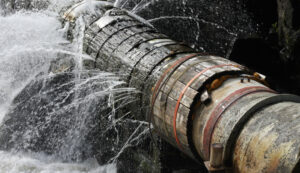When searching for plumbers, it’s essential to find out if they are licensed. Many states require that plumbers complete government tests to receive their certification. This can help ensure the plumber is trained and up-to-date on the latest building codes and professional practices.

Also, ensure the plumber offers warranties and guarantees on their work. This will give you peace of mind if anything goes wrong with the plumbing in your home. Contact Plumbers Sarasota for professional help.
The discharge pipe is where the water from the sump pump is directed outside the home. During rainy seasons, this can prevent flooding of the basement and damage to the foundation of the home. If you notice that your sump pump is not draining as it should, there could be a blockage in the discharge line. In this case, you will need to remove the obstruction and clean the discharge pipe.
Before you start working on the pipe, make sure that it is not powered on. This will help you avoid potential electrical shocks and injuries. It is also important to clear any debris from the discharge point of your sump pump. This will allow the water to flow freely and will minimize the risk of clogs. If the clog is severe, you may need to use a plumber’s snake to break it up.
During the winter, the discharge pipe could freeze, which will cause it to clog. This is why it is important to install the line two feet below the frost line in your area. Using a deeper discharge line will allow the water to travel further before it freezes. It is also easier to dig up and open the pipe if you need to do maintenance work on it.
If you want to protect your sump pump from freezing, you can install a dual discharge system. This will ensure that the backup pump continues to run even if the primary discharge line freezes. You can also use a freeze guard or heat tape to prevent the pipe from freezing. This will reduce the risk of your basement being flooded by cold temperatures or a frozen drainage line.
Check valve
Check valves are devices that prevent backflow of media like liquids, air, other gases and steam in a line. They are also known as non-return valves, foot valves, reflux valves and retention valves. They are very important for the operation of many industrial equipment and utilities like pumps, compressors, boilers, power plants, chemical feed systems, oil refineries, cooling towers and gas processing facilities. Check valves are mechanically operated and function automatically; unlike on/off control valves, they do not require air, electricity or a human being to open and close them.
They operate when the fluid pressure on the inlet side is greater than or equal to the fluid pressure on the outlet side of the valve. This difference in pressure is referred to as the valve’s cracking pressure. It is important to know the specific cracking pressure of your valve(s) when selecting and installing them in a system.
There are multiple types of check valves, each with a unique operating mechanism. For example, some valves are designed with a spring that pushes the closing mechanism against the valve seat to stop media flow; others use a guided disc or poppet energized by a spring. The type of check valve you select depends on the media, temperature and other variables in your system.
For example, polyvinyl chloride (PVC) check valves are suitable for water and most corrosive media. They can withstand high temperatures, but are not immune to concentrated acids and oxidizing solvents. Stainless steel and other metals are usually used in the most demanding applications. They are very durable, but can be more costly than plastic or PVC valves. When choosing a check valve, it is important to ensure the longest trouble-free service by selecting one that is properly sized for the application and system. Often, the incorrect valve size is selected based on the desire for the largest Cv possible, which can cause premature failure. Alternatively, the wrong style of check valve is installed in the piping system which will also reduce its performance. By taking the time to select and install the right valve for a system, you can save money and avoid premature wear.
Battery
Battery is an electrochemical cell that holds a charge and powers devices that require an electric current. Batteries are available in a range of sizes, voltages and output levels. The most common types are AA, AAA, C, and D batteries. The output of a battery depends on the size and strength of the reactions that occur at both electrodes and the type of chemical products formed during the reaction. A battery’s power is equal to its voltage times its current. The higher the current, the more work a battery can do. Voltage is the force at which the reaction driving a battery pushes electrons from the cathode to the anode. It is also known as electrical potential. Current is the number of electrons passing through any point in a battery’s circuit at a given time.

